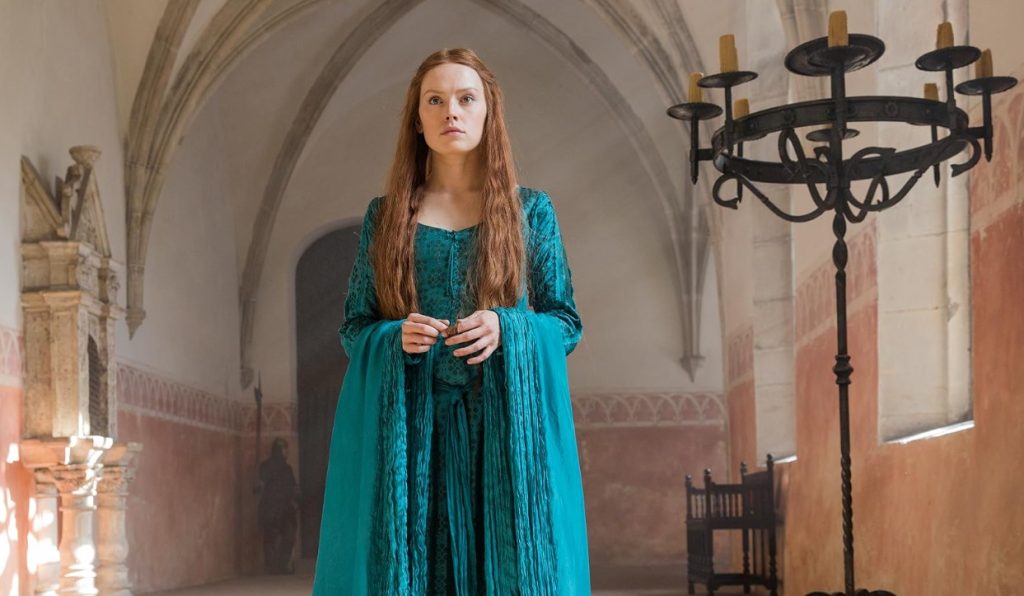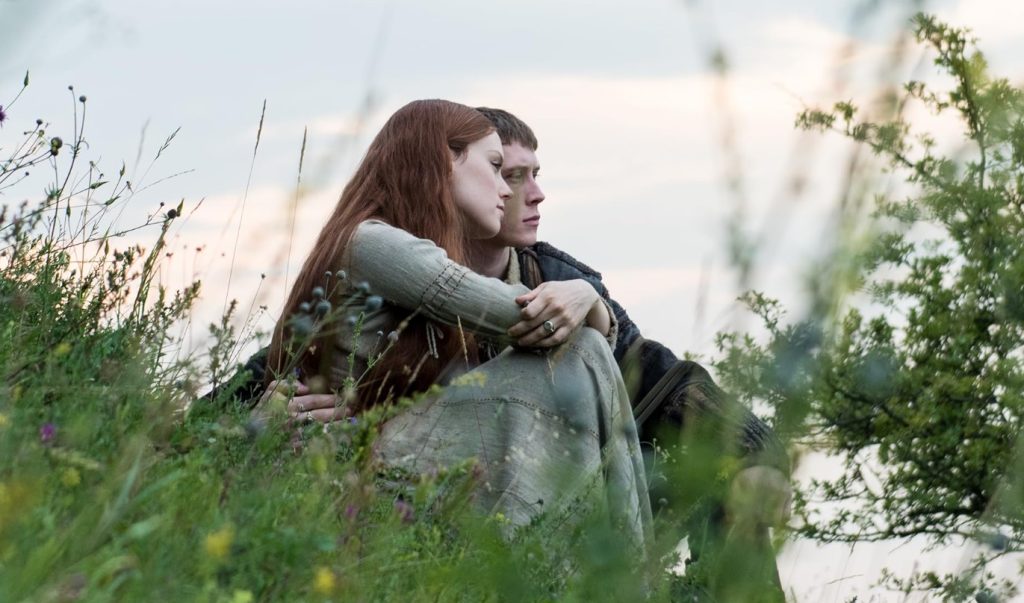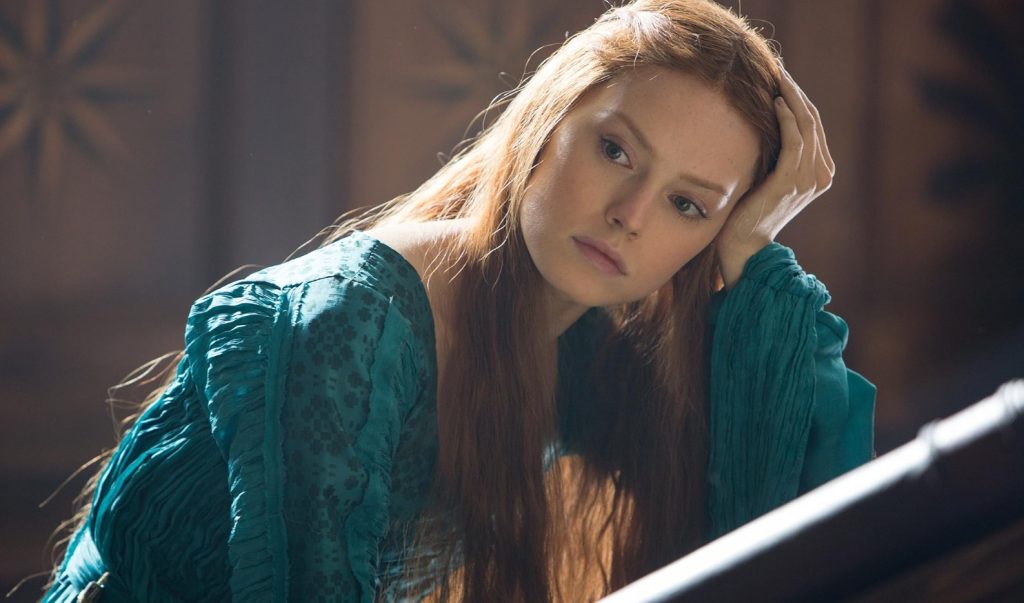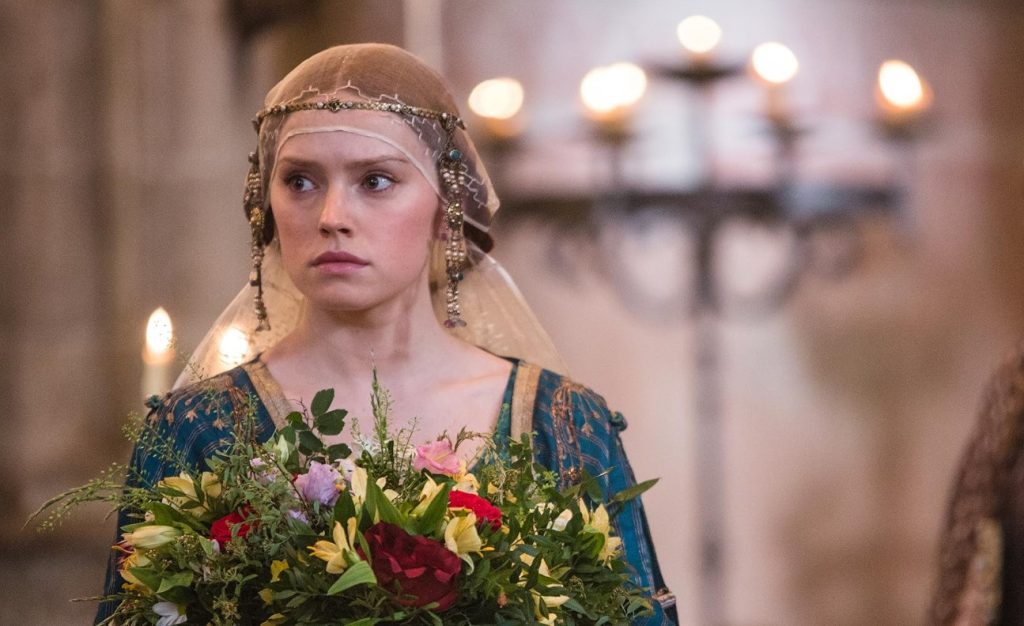
Ophelia (2018) is a visually stunning and emotionally captivating reimagining of William Shakespeare’s classic tragedy Hamlet, told from the perspective of one of literature’s most enigmatic and tragic figures—Ophelia. Directed by Claire McCarthy and adapted from Lisa Klein’s novel of the same name, Ophelia offers a refreshing feminist twist on the age-old tale, positioning the titular character not as a passive victim but as a bold, intelligent woman with her own agency. With a stellar cast, breathtaking cinematography, and a thought-provoking script, Ophelia stands out as a unique and compelling reinterpretation that breathes new life into a timeless story.
From the very first frame, Ophelia captivates viewers with its lush visuals and hauntingly beautiful aesthetic. The film transports us to a vividly realized medieval Elsinore, where palace intrigue, power struggles, and forbidden love unfold amidst an atmosphere of impending doom. The cinematography is painterly, with soft lighting and rich colors that evoke both the romance and the tragedy at the heart of the story. Each scene in Ophelia is crafted with visual poetry, enhancing the emotional depth and immersive quality of the film.
At the center of Ophelia is Daisy Ridley, who delivers a performance full of nuance, strength, and vulnerability. Known for her role in the Star Wars sequel trilogy, Ridley proves her dramatic range in Ophelia, embodying a character who is often misunderstood and sidelined in Shakespeare’s original play. In this reimagined version, Ophelia is no longer a symbol of madness or a victim of courtly manipulation. Instead, she is portrayed as a sharp-witted, independent young woman navigating a treacherous world with courage and determination. Ridley’s portrayal gives Ophelia a powerful voice, allowing audiences to see her not just as Hamlet’s lover but as the architect of her own destiny.
The supporting cast of Ophelia is equally impressive. Naomi Watts plays dual roles as Queen Gertrude and the mysterious Mechtild, adding layers of complexity to the story. Watts brings regal poise and maternal vulnerability to Gertrude, while also embodying the more mystical and radical character of Mechtild, who becomes a mentor to Ophelia. Clive Owen is menacing as Claudius, embodying the ambition and ruthlessness of a man driven by power. George MacKay plays Hamlet with a mix of passion and despair, creating a believable and intense dynamic with Ridley’s Ophelia. The chemistry between the two leads is palpable, grounding the film’s romantic core.
What sets Ophelia apart from other Shakespeare adaptations is its narrative perspective. By shifting the focus to Ophelia, the film invites viewers to reconsider the events of Hamlet through a new lens. This approach doesn’t just offer a different point of view; it redefines the entire narrative structure. In Ophelia, the titular character is not a mere pawn in the game of kings—she is a player in her own right, with motives, desires, and secrets that shape the course of the story. This shift in perspective is both empowering and enlightening, shedding light on the inner workings of a character often reduced to a symbol of fragility.

The screenplay, penned by Semi Chellas, skillfully blends Shakespearean dialogue with modern sensibilities, making the story accessible to contemporary audiences without sacrificing its poetic essence. The language in Ophelia retains a lyrical quality, yet it is grounded enough to resonate with modern viewers. This balance allows the film to maintain its dramatic gravitas while delivering a fresh and engaging narrative.
One of the central themes of Ophelia is the struggle for autonomy in a patriarchal world. Throughout the film, Ophelia fights to assert her voice and control her fate in a court dominated by men. Her intelligence, compassion, and defiance become acts of rebellion against a system that seeks to silence her. This feminist undercurrent runs throughout the film, turning Ophelia into more than just a reinterpretation—it becomes a declaration of agency and resistance. The film explores the constraints placed on women in historical and literary contexts, challenging viewers to rethink the roles women have traditionally played in both fiction and reality.
Ophelia also delves into themes of madness, love, and betrayal, but with a new twist. Unlike in Hamlet, where Ophelia’s descent into madness is portrayed as a tragic inevitability, Ophelia suggests that her “madness” is a calculated performance, a means of survival and escape. This reinterpretation adds depth and intrigue to her character, portraying her not as broken but as resilient and strategic. It redefines strength not as brute force but as emotional intelligence and adaptability.
Musically, Ophelia is underscored by a haunting and melodic score that enhances the film’s ethereal tone. The music swells at just the right moments, intensifying the emotional impact of key scenes without overwhelming them. The use of traditional instruments and choral elements contributes to the film’s period feel while reinforcing its mystical and romantic atmosphere.

The production design of Ophelia deserves special mention. From the grandeur of the Elsinore palace to the lush forests and hidden chambers, every set piece in Ophelia is meticulously crafted. The costumes are rich with texture and detail, reflecting both the status of the characters and their psychological states. Ophelia’s transformation is mirrored in her wardrobe, shifting from the soft and delicate hues of innocence to the darker, more complex tones of maturity and independence.
The pacing of Ophelia is deliberate, allowing the story to unfold gradually while maintaining a sense of tension and intrigue. The film does not rush to its conclusion; instead, it invites viewers to linger in its world, to observe the nuances of court politics, personal relationships, and hidden motives. This slower pace enhances the film’s reflective tone, encouraging deeper engagement with its themes and characters.
From an SEO perspective, Ophelia is a film that continues to generate interest among fans of Shakespeare, feminist literature, and period dramas. The focus keyword “Ophelia” remains relevant in discussions about literary adaptations, strong female leads, and reinterpretations of classic texts. Bloggers, reviewers, and film enthusiasts searching for unique takes on Shakespearean works are likely to find Ophelia both compelling and discussion-worthy.
Critically, Ophelia received mixed reviews upon release, with some praising its ambition and visual style, while others critiqued its departures from the source material. However, what cannot be denied is the film’s courage in reimagining a well-trodden narrative through a fresh, feminist lens. It challenges traditional interpretations and invites viewers to engage with Shakespeare in a way that feels new and necessary.

In classrooms and literary circles, Ophelia serves as an excellent companion to studying Hamlet. It opens up conversations about gender, narrative voice, and historical reinterpretation. Students and scholars alike can explore how Ophelia subverts expectations, offering a character study that adds complexity to the world of Elsinore.
For viewers seeking a film that is both intellectually stimulating and emotionally resonant, Ophelia delivers. It is a cinematic experience that lingers in the mind, encouraging reflection long after the credits roll. The film speaks to a universal desire to be seen, heard, and remembered—not as a footnote in someone else’s story, but as the author of one’s own.
In conclusion, Ophelia is a powerful and visually arresting reimagining of a literary classic. It takes a secondary character from one of the most famous plays in history and places her at the center, giving her a voice, a story, and a legacy. With a brilliant performance by Daisy Ridley, a strong supporting cast, and a clear directorial vision, Ophelia is a film that deserves recognition for its artistic courage and cultural significance.
Whether you are a Shakespeare purist, a lover of period dramas, or someone looking for a strong female protagonist, Ophelia offers something unique and memorable. It is a film that not only redefines a character but redefines how we engage with stories from the past. In reclaiming Ophelia’s narrative, the film gives her what she never had in Hamlet—the power to live, to love, and to choose her own fate.





